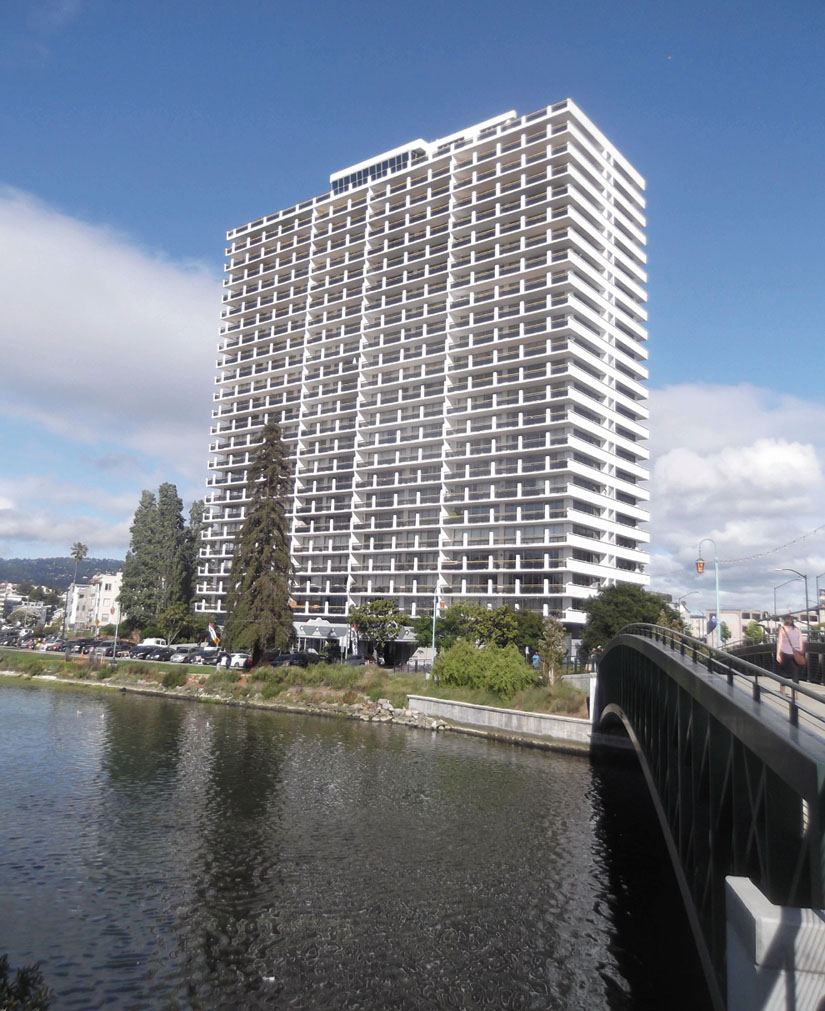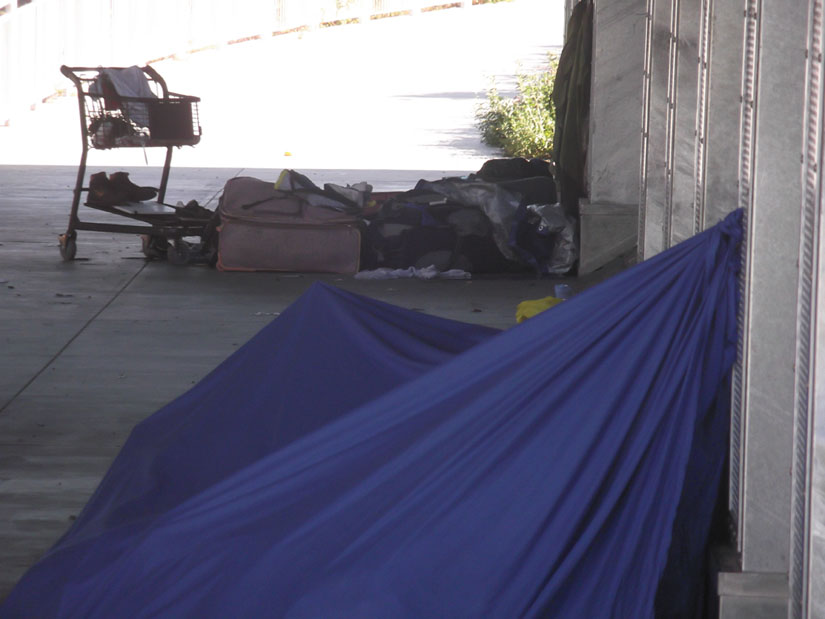
by Kheven LaGrone
In January 2016, the Oakland City Council declared a shelter crisis. They acknowledged that a significant number of Oakland citizens had no ability to obtain housing in the city. The City Council then gave the City Administrator 15 days to open up the Lake Merritt Garden Center or some other facility as a temporary shelter.
Then in April 2016, the City Council voted to adopt “Love Life” as the city’s motto. It was another way of saying “love thy neighbor.” The council hoped this new motto would help spread brotherly-sisterly love throughout the city. This would help reduce violence by humanizing the “new” Oakland.
How would these two council actions impact Tim Banks, a homeless man whom the City had removed from the encampment at Lake Merritt that neighbored a luxury high-rise apartment building?
Because Banks was homeless and lived in the encampment at the foot of Lakeshore Avenue, people walking around the lake, as well as some people living in the nearby luxury high-rise, openly dehumanized him to his face. They let him know that he was disdained and unloved. This hurt him.
“They think we’re trash, filthy and unsanitary,” he told me. “They told me that I made the area look bad because of my circumstance. They said, ‘You shouldn’t be here.’ They asked me, ‘Isn’t there somewhere else where you could set up camp?’”
Banks was especially humiliated when the City chased him and others out of the encampment, as if they were intruders or vermin. City officials came out and gave them 24 hours to leave. It was winter. Even though the Oakland City Council was discussing the declaration of a shelter crisis, the City didn’t offer him or the other homeless people anywhere else to go.
City officials just told them to leave, and then came back with the police to remove those who wouldn’t leave. The police intimidated homeless people. Homeless people didn’t want trouble. They didn’t want to go to jail. The homeless citizens didn’t know where to go, but they moved without protest.
At the time, Tim Banks had a tent at the Lake Merritt encampment. He asked the City for a one-day extension because he had to go to work. When he returned from work the next day, the City had taken his tent. He was told that he could retrieve it, but he didn’t know exactly where it was being stored and he couldn’t take the time off from work.
The City told Banks that he was being displaced because of complaints coming from some people living in the nearby luxury high-rise apartments. I spoke to people at the City about shutting down the Lake Merritt encampment. They sympathized with the people in the encampment, but they had to respond to the complaints from people living in the high-rise and people walking around the lake.
Many complained in the social media. They posted pictures of the encampment with dehumanizing, vilifying comments. Because homeless people had no access to social media, they could not defend themselves. In effect, they were voiceless.
Banks moved to another encampment in San Francisco, until San Francisco shut it down too. My contacts in the City of Oakland explained the problems that result from clearing encampments without giving the people somewhere else to go. They move to other encampments, and this may heighten tension and anxiety.
Established encampments offer the people some security because they know each other and have social bonds. By closing the encampments, the City sends the people to other encampments where they are strangers. This causes disruption and fear. (Note: The people I spoke to at the City of Oakland supported my writing this essay. They felt it was important to humanize the people living in the Lake Merritt encampment.)
Those complaints about the homeless encampments placed Oakland officials in a quandary. Should the City enforce the bullying of its most powerless and vulnerable communities? Or should the City promote a culture of human kindness and brotherly/sisterly love as a part of curbing violence citywide? Does Oakland value the few people who can afford to pay rents of up to $5300 per month more than their neighbors living nearby in the Lake Merritt encampment? If so, what other groups are devalued in the “new” Oakland? Does the “new” Oakland value newcomers more than long-time residents?
With nowhere else to go, some homeless people returned to live in the Lake Merritt encampment. Some new homeless people moved in as well. People walking around the lake, as well as some people living in the high-rise apartments, complained to the city again.

Soon, the City kicked homeless people out of the encampment again. Some would return and the cycle repeated.
Ironically, as part of the declaration of a shelter crisis, Oakland was to find city property to use as shelter. Lake Merritt is city property. Why didn’t the City move the encampment to the Lake Merritt Garden Center?
Banks wishes the people who verbally accosted him, and complained to city officials, understood his circumstances. He wishes they would see him as another human being and not the stereotype that they revile. He does not drink or do drugs.
He has a job, but could not afford an apartment in the new Oakland. He does not consider himself to be “homeless,” but in transition to obtaining an apartment. He saves his money in a bank account. In the meantime, he had bought the tent to live in the encampment. He even fixed it up with a rug to make it his home.
Banks is working to improve his situation. He applied for Section 8 housing. He has gone to different organizations to sign up for low-income housing. However, those agencies have limited resources. They use a lottery system to decide whom they can house. He never gets called.
He tries not to let anger get the best of him and tries to stay positive. Still, he’s been angry and frustrated from not knowing where he was going to lay his head the next night. He understands how homeless people can be on edge and ready to snap. He understands how they can be broken.
“People judge you because of the transition you go through,” he says. “They judge you differently. People say things because of what they see.” He experiences the worst side of people and says, “Some people can be selfish and lovers of themselves. They have no conscience and no heart — it slaps me in my face everyday.”
He wishes others would be more considerate of people like him going through this transition. “Stop looking down on us. You could end up in this situation.”
People in the “new” Oakland intentionally and unfairly hurt Mr. Banks because they felt entitled to a prettier lake. They dehumanized him so as to justify pressuring the City to remove him like vermin. In the same way, Hitler dehumanized Jews in order to justify the Holocaust. The Ku Klux Klan dehumanized African-Americans to justify lynching them. Oakland must not condone such dehumanizing mistreatment of its residents because history proves it can lead to violence.
Oakland needs the motto “Love Life” as a way of spreading brotherly/sisterly love to everyone. To put it differently, “love thy neighbor,” even if you live in a luxury apartment and your neighbor lives in an encampment. Oakland had a visible homeless community even before people started calling it the “new” Oakland. So anyone coming to Oakland should not be offended by seeing homeless people.
Treating people like trash and clearing homeless encampments are acts of violence because they violate someone’s humanity — no matter what excuse is used to justify it.

